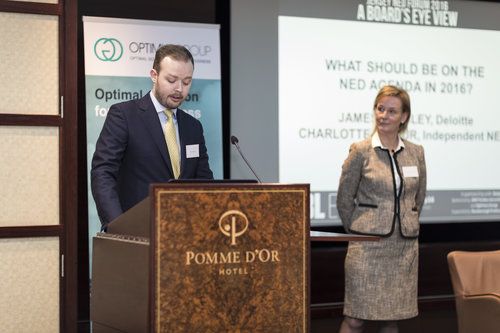

Technology megatrends, the importance of succession planning and crisis management were just some of the hot topics being discussed by the island’s non-executive directors (NEDs) at a forum last week.
Over 70 of the islands’ senior business figures attended the morning organised by BL Events, which attracted speakers from the local non-executive community as well as two leading financial services experts from Deloitte UK.
"NEDs working in the financial services sector today face even greater challenges than they ever have done before," states Helen Gale, Partner at Deloitte.
"The session highlighted just how many issues the NED has to face on a day-to-day basis and the pressure on NED’s to constantly assimilate new market insight needed to perform the role. Our speakers gave some fascinating presentations and insights from what they experience at the sharp end of being on a board."
The programme opened by asking what should be on the NED agenda for 2016. James Beasley, a financial services governance specialist from Deloitte, and Charlotte Valeur, an independent NED and founder of Board Apprentice, started by sharing their insights into the role of the board in strategy setting and advised that the board needs to ‘live the strategy’ on an ongoing basis.
The pair also considered the risks and opportunities that disruptive influences present for boards. NEDs should be considering mitigation and maximisation strategies.
Ms Valeur spoke about the importance of succession planning within the board and stated that the role of the NED as a leader meant that they should be looking at sustainability and develop a culture of nurturing future talent for the benefit of the organisation.
David Wilson, Partner at Lacey Advocates, gave the delegates an update on directors’ duties and liabilities.
It was stressed that directors cannot rely on their co-directors to perform their duties and that it was imperative for all directors to acquire a sufficient understanding of the business to appreciate its shortcomings.
Mr Wilson cited examples from the Bank of England (FCA/PRA) report into the failure of HBOS. He highlighted that the board had failed to instil a culture that balanced risk and return appropriately, lacked sufficient experience and knowledge of banking and failed to challenge executive management effectively.
He urged the audience to use public statements to examine their own board’s actions and take stock of any shortcomings. Mr Wilson concluded by advising NEDs to look at three aspects of their own and their co-director’s suitability and effectiveness – integrity, conflict of interest and record keeping.
Richard Sheath of Independent Audit spoke of his many years’ experience of performing effectiveness reviews and observing board behaviour and revealed some fascinating insights into board dynamics.
He reminded the audience that boards are only human and that factors like environment, time and how a meeting is organised will affect how well the board members can perform. The increase in diversity of backgrounds and skill sets on modern boards means managing different personalities and encouraging the group to work as a team is key. He also warned of the dangers of a dominant chairman and touched upon the effect of board politics on everything from the seating plan to how the board interact with the executive.
Margaret Doyle, Partner and Head of Deloitte’s Financial Services Insight team, reported on some of the technology megatrends that should be on the NED radar. Disruptive innovations such as mobile payments, alternative lending, mobile wealth management and process externalisation are reshaping the way financial services are structured, provisioned and consumed.
Regulation and macro economics are the drivers dominating banks’ management agenda but future challenges that should be on the NED agenda include long-term customer behaviour shifts and increased competition from challenger brands as technology dramatically cuts the cost of market entry.
Ms Doyle went on to talk about cyber crime, which now includes targeted attacks and ‘smart spam’, selective targeting of banks and healthcare companies, ransomware, mobile payment systems and state-sponsored attacks.
She encouraged NEDs to develop an integrated approach and response plan to cyber security with board-level accountability.
The impact of poor board decisions was highlighted by Helen Hatton, Managing Director, Sator Regulatory Consulting. She gave the audience a number of illustrations that resulted in less than optimal performance leading to at best, poor growth and at worse catastrophic crisis.
Wrong clients taken on, ‘red flag’ events missed, weak hiring or firing decisions, ill-fated mergers or, conversely, good opportunities lost should all be on the NED radar, she explained.
Ms Hatton observed that on a macro level OECD initiatives are a serious threat to the island but, with the right response, present the opportunity to position Jersey as a centre offering the required quality of sophisticated governance, control and service levels to survive and flourish in the new CRS/BEPS world is also clear.
A panel session concluded the programme, touching upon some legal and liability issues facing NEDs. They reflected that given the extent of liabilities attached to any position on a board, understanding the history and quality of board management decisions and the skills of the board members is critical before accepting any role.
Nick Kirby, Editor-in-Chief of BL magazine, who hosted the event, said: "I think that all of the delegates came away having learned something new - one thing that particularly stuck with me was that a NED’s liability can even continue after their death. I suspect that came as a surprise to many. All in all, I think it was a fascinating day."
Comments
Comments on this story express the views of the commentator only, not Bailiwick Publishing. We are unable to guarantee the accuracy of any of those comments.